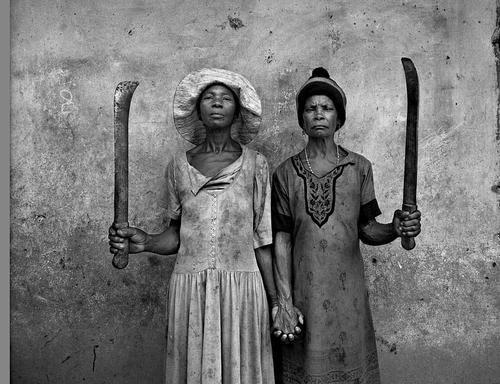The Forgotten History of Black Women Crying Out Against Sexual Assault
By Phyllis Chesler

Last week, Recy Taylor, the victim of a 1944 brutal white-on-black gang-rape in Alabama, died. She was 97 years-old. Taylor was also the subject of a nationwide crusade against the rape of black women in the Jim Crow South.
There is a long and buried history of Black American women speaking out against rape and braving considerable shame in order to testify, in detail, about the most terrifying ordeals.
However, such anti-rape and anti-sexual harassment campaigns have been repeatedly forgotten or ghettoized.
In 1971, I was one of the keynote speakers at the first-ever New York Radical Feminist Speak-Out on Rape in NYC.
However, neither I, nor the other mainly white feminists gathered there, knew anything about the 1944 rape of Recy Taylor in Alabama, or about the nationwide protest campaign that followed.
Taylor’s story, only one among many, was carefully documented, but only thirty eight years later, by historian Danielle L.McGuire in her powerful book At the Dark End of the Street: Black Women, Rape, and Resistance—a New History of the Civil Rights Movement from Rosa Parks to the Rise of Black Power. This book led to a 2017 documentary on the subject, The Rape of Recy Taylor.
Most white feminists had no idea that the NAACP, a host of other organizations, and thousands of individuals had once campaigned for justice for Taylor. Her rapists were six white men and their identities were known; one even confessed. But the grand jury refused to indict twice.
In general, feminist as well as minority histories have been systematically disappeared. As the Australian scholar Dale Spender has documented, each new generation is doomed to reinvent the feminist wheel.
The lynching of Black men and the rape of Black women were normalized in the Jim Crow South. Any Black woman who dared “tell” was threatened with death—and the death of her family. White men were never held accountable for raping Black women, not during slavery, not afterwards, in the Jim Crow South.
Unsurprisingly, Taylor has many Foremothers, including Celia, a Missouri slave. Historian Melton A. McLaurin published an elegant book about her case—but not until 1991. We did not know about Celia until 20 years after our Speak-Out.
In 1850, an aging widower and farmer, Robert Newsom, purchased Celia, a fourteen-year-old child. Newsom raped Celia on the way to her new home; by the time Celia was nineteen she had given birth to two of Newsom’s children.
Celia warned Newsom to keep away. When he advanced upon her anyway, she killed him, burned his body in her fireplace, crushed his bones, and hid some of the ashes. Celia did not flee.
Boldly, Celia denied everything. Faced with evidence, Celia finally confessed. Newspaper reports claimed that the murder had been committed “without any sufficient cause.” This lie was repeated in William Lloyd Garrison’s The Liberator—which meant that other abolitionist newspapers paid little attention to the story.
Celia was tried by an all-white, all-male jury and judge. Four of the jurors owned slaves. Although the judge remained hostile, Celia’s highly experienced white defense attorney, John Jameson, argued that Celia had the moral, and possibly the legal right to kill in defense of her honor and her life. According to McLaurin, this argument was both “as bold as it was brilliant.”
This may have been the first time in American history that a woman, slave or free, was seen as having such a right.
Jameson wanted Celia acquitted. The jury found her guilty and she was sentenced to hang. On December 21st, 1855, Celia was “marched to the gallows… the trap was sprung and Celia fell to her death.”
Celia also has many descendants. For example, in 1974, twenty-year-old Black American, Joan Little, killed her white jailor in Washington, North Carolina after he had entered her jail cell brandishing a pick-ax, demanding (and receiving ) oral sex. Little turned the pick-ax on her rapist and fled. Little was not a slave but she was imprisoned.
Civil rights activists and feminists launched a campaign on her behalf. A jury of six Whites and six African Americans found her not guilty.
Also in 1974, Hispanic-American, Inez Garcia, was tried for killing the man who held her down while another man raped her. Garcia was convicted and sentenced to five years to life. Feminist lawyer, Susan Jordan, appealed her verdict, arguing that a woman had the right to use deadly force against a rapist. In 1977, the California Court of Appeal overturned the verdict and freed Garcia.
Despite such verdicts, whether a woman has the right to kill a would-be rapist in self-defense remains an open question.
There are many other questions whose answers remain unknown.
Will the #MeToo movement remain only virtual? Will it affect only a small number of high profile women or will this incredible outcry grow legislative and enforcement “legs?”
Will it have the power to gentle male sexual violence or will women continue to face retaliation for alleging job-related sexual assault?
Will women themselves continue to collaborate in covering up such violence because the man in question is powerful, useful, or even great?
It’s too soon to tell. One thing is certain: Billions of women, both dead and alive, are speaking through us. Our voices cannot be stopped.
First published in Huffington Post.







